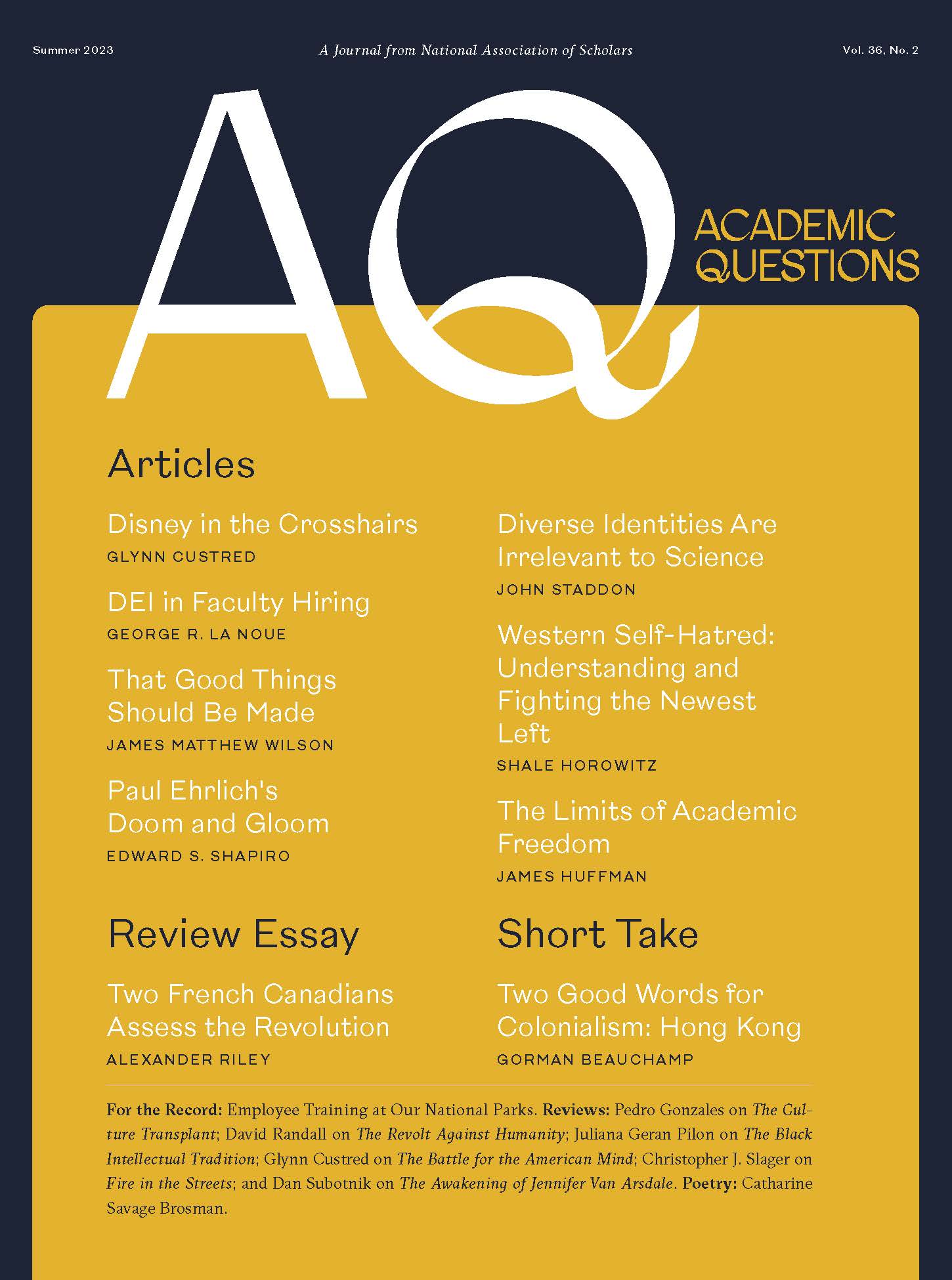The Fourth of July was a distinctive one in 2023, and not just because it fell on a lonely Tuesday so did not automatically bring a three-day weekend. On Thursday, June 29th and Friday the 30th, the last two days of June preceding the Fourth, the Supreme Court issued three firecracker decisions with six justices in the majority of each.
On the 29th, at long last, race preferential college admissions, aka affirmative action, were declared unconstitutional, and the Court affirmed the Fourteenth Amendment as guaranteeing equal treatment under the law to all individuals regardless of race. On the next day, Joe Biden’s proposed student loan bailout to the tune of almost half a trillion dollars was also denied by the Court as outside of the president’s authority. Further, there was a third decision in favor both of religious freedom and freedom of speech, including prohibition of the compelled speech or compelled expression of woke ideology, which may have broad implications for mandated DEI strictures in academia and the workforce and the many executive orders that support them.
All at once it appeared that the Constitution was working again. Not everyone will agree with everything, of course, but you could hear the gears clicking and meshing—separation of powers, checks and balances, judicial review. The outlines of the country that seemed to be disappearing were at least somewhat visible again—the rule of law, the bill of rights, freedom of speech, equality before the law. The best part is that it’s all out in the open, no more hiding; the subterfuges of affirmative action are exposed and repudiated, after so long disguised as “diversity,” more recently amplified with “equity” and “inclusion.” The Court repudiated the claim of the “educational benefits” of diversity that could not in any event override the Equal Protection Clause of the Fourteenth Amendment. Clarence Thomas is surely right in saying in his concurrence that Grutter (Grutter v. Bollinger, 2003) has been overturned.
There was even some questioning by the justices of the arbitrary and untenable racial designations we’ve been laboring under since the onset of mass Third World immigration in the 1960s and 1970s. “Hispanic” and “Asian” are made up categories, each containing dozens of nationalities and all races, including white and Caucasian, although those designated under these terms are generally called “people of color” for the purpose of maintaining division.
So much confusion had arisen about the Fourteenth Amendment allowing color consciousness if that would favor a group formerly discriminated against that even conservatives were suggesting not to use the Amendment in opposition to affirmative action, but to use Title VI instead. This was troubling: the civil rights laws must be based on the Constitution, no? And now Chief Justice John Roberts, writing for the majority in the Students for Fair Admissions v. Harvard (2023) decision (which took in both the Harvard and the University of North Carolina cases), and with Thomas emphatically concurring, has affirmed that they unequivocally are. The Constitution’s Fourteenth Amendment with its Equal Protection Clause is the overarching structure in which Title VI and the civil rights laws are built.
“Many universities have for too long wrongly concluded that the touchstone of an individual’s identity is not challenges bested, skills built, or lessons learned, but the color of their skin,” Roberts observed. “This Nation’s constitutional history does not tolerate that choice. The race-based admissions systems . . . fail to comply with the twin commands of the Equal Protection Clause that race may never be used as a ‘negative’ and that it may not operate as a stereotype.” That is, a “stereotype” to create “critical mass,” the euphemism employed in Grutter for the desired “quota” of underrepresented minorities, the forbidden word now used openly by Thomas and Gorsuch in their concurrences, which has been the surreptitious meaning of affirmative action from the time of LBJ’s Howard Commencement speech in 1965, in which he called for “equality as a result.”
Maybe not surprisingly, many on both left and right could not bring themselves to accept the Students for Fair Admissions decision as the final word. The long struggle and multiple detours and false hopes and disappointed expectations have left behind a streak of cynicism and perhaps a little hardness of heart. On the other hand, for supporters of affirmative action, the veneer of “equity” it affords has become part of their emotional makeup in confronting modern life.
At any rate, whether out of disappointment or disbelief or defiance, many on both left and right predicted that affirmative action would continue through various means, some legal, some perhaps skirting legality. “This Isn’t the End of Affirmative Action,” ran the typical headline, whether proclaimed hopefully or warily. Some saw a large loophole in the application essays in which Roberts allowed that students could discuss how race had been part of their individual experience. Having read through the machinations that Harvard and the University of North Carolina have been practicing and having educated himself on the way previous high court decisions have been disingenuously deployed, Roberts warned sternly that the essay should not be seen as a way to import race preferences back into the equation. True, he didn’t specifically define the allowable perimeters, as our keen-eyed skeptics quickly noted, but he did establish the required disposition of mind. That can’t be flouted without revealing something about the flouter, to himself and others. It’s kind of like the oath that must be taken “without any mental reservation or purpose of evasion.”
Others believe socioeconomic factors will be used, and they were suggested as possible race neutral means to achieve diversity of group by more than one justice. These are not as sure a bet as some seem to think, however. David French, for example, wrote hopefully in response to the decision that
because of past injustice, race-neutral policies can have race-disproportionate outcomes without engaging in invidious discrimination against innocent applicants. To treat all economically disadvantaged kids the same, regardless of race, results in both systemic change—Black and Latino youth would benefit disproportionately—and individual fairness.
Actually, this is not clearly the case. Aside from the difficulties inherent in deciding what will constitute poor or lower class, any truly race neutral criteria will likely include many whites and Asians, unless there is the intention to shape the criteria and selection toward underrepresented minorities, that is, to use the racial preference no longer permitted.
Legal scholar Gail Heriot points out another problem with class-based preferences, that they may produce the same problems as race-based preferences have. The whole issue of “mismatch” surfaced prominently as never before in the debates over the SFFA suits, even more than in the Fisher case (Fisher v. University of Texas, 2016) where it first appeared. When placed in schools with a generally higher level of academic preparedness, even good minority students have been foundering, sometimes dropping out, or switching to less demanding majors, or ranking lower in the class, thus tending to enforce stereotypes rather than overcoming them. A “major criticism of race-based preferences is that they weren’t doing their beneficiaries any favors,” Heriot writes. “Instead, by putting underrepresented minority students at schools where their academic credentials placed them toward the bottom of the class, they made it more difficult for them to succeed.” And she extends the point to class based preferences as well: “A heavy thumb on the scale in favor of low-income students will produce the same problem.”
Which brings up the elephant in the room—the education itself! The subjects, the disciplines, the humanities, the sciences, the liberal arts! All that sneaking and lurking and defending and justifying, aiming for group representation and so-called social justice has wreaked havoc on the traditional curriculum.
Now we can embrace the honesty of true qualification for whatever school, rolling up one’s sleeves, and tackling the great legacy, digging in for a real education, rather than serving as window dressing for guilt ridden liberal whites and spending time on phony and condescendingly trumped up and dumbed down subjects and courses and areas and studies that appeal to one’s presumed level of interest and ability. Take the real thing, the classics, to grow in yourself and feel yourself part of the culture, instead of flaunting prestige degrees that many suspect were not really earned. Enough with the lifelong chip on your shoulder like Michelle Obama and those Ivy League television commentators barking continually about injustice and white supremacy.
One of the surprises in recent decades has been how readily professors and scholars betrayed their disciplines when the political winds blew against them. If you are over a certain age (maybe fifty?) you learned to treat your discipline with a certain sacredness; it was your link to truth, to experiential access to the great accumulation of human wisdom. To see professors and scholars shredding their formerly cherished texts and tossing the bits and pieces to the wind, whirling in ecstasy to the savage indictments of Ibram X. Kendi and the like was an astonishing spectacle. To see scientists and physicians surrendering their conscientious objectivity and strict professionalism to abase themselves with apologies for their fields and promises to serve DEI was perhaps even more astonishing.
Now, as if all this wasn’t enough for a Happy Fourth, there was in addition to the three firecracker decisions issued on June 29 and 30, a bonus few were expecting. On the Fourth itself, the very day, a federal judge issued an order in Biden v. Missouri (2022) prohibiting the White House from coercing media platforms “to suppress disfavored speakers, viewpoints and content,” violating freedom of speech in what amounted to a veritable “Orwellian ministry of truth,” in Judge Terry A. Doughty’s words. The case had been brought by the attorneys general of Louisiana and Missouri and by five individuals, including Dr. Jay Bhattacharya, co-author of the Great Barrington Declaration and one of the prominent scientists whose views of the Covid pandemic differed from the government line and who experienced cancellation and de-platforming as a result.
Just three years shy of our Semiquincentennial, which will celebrate 250 years from the nation’s birth in 1776, it is worth recalling a memorable Fourth of July statement on the occasion of the 150th anniversary, in 1926, from Calvin Coolidge, thirtieth president of the United States, regarding the Declaration of Independence, which he called “a spiritual document”:
About the Declaration there is a finality that is exceedingly restful. It is often asserted that the world has made a great deal of progress since 1776, that we have had new thoughts and new experiences which have given us a great advance over the people of that day, and that we may therefore very well discard their conclusions for something more modern. But that reasoning can not be applied to this great charter. If all men are created equal, that is final. If they are endowed with inalienable rights, that is final. If governments derive their just powers from the consent of the governed, that is final. No advance, no progress can be made beyond these propositions. If anyone wishes to deny their truth or their soundness, the only direction in which he can proceed historically is not forward, but backward toward the time when there was no equality, no rights of the individual, no rule of the people. Those who wish to proceed in that direction can not lay claim to progress. They are reactionary. Their ideas are not more modern, but more ancient, than those of the Revolutionary fathers.
Or, as Samuel Johnson put it, “the mind can only repose on the stability of truth."
And that is where our writers in this issue begin:
- Glynn Custred puts “Disney in the Crosshairs.”
- George La Noue asks, “DEI Hiring Statements: Common Good Ethics or Partisan Loyalty Oaths?”
- In our poetry series, “That Good Things Should Be Made,” James Matthew Wilson elucidates Richard Wilbur’s “Mayflies.”
- Edward S. Shapiro probes the uncanny tenacity of “Paul Ehrlich’s Doom and Gloom.”
- John Staddon patiently explains why “Diverse Identities are Irrelevant to Science.”
- Shale Horowitz offers counsel on “Western Self-Hatred: Understanding and Fighting the Newest Left.”
- James Huffman sketches “The Limits of Academic Freedom.”
- In a review essay, Alexander Riley gives the Francophone view of the culture wars in “Two French Canadians Assess the Revolution.”
- “Two Good Words for Colonialism: Hong Kong” is an evocative Short Take from Gorman Beauchamp about that now beleaguered oasis in the Far East.
- In “Employee Training at Our National Parks,” a feisty contributor describes one employee’s effort to stand up to ideological indoctrination in a federal agency.
Carol Iannone is editor-at-large of Academic Questions, 420 Madison Ave., 7th Floor New York, N.Y. 10017; [email protected].
Photo by Tingey Injury Law Firm on Unsplash













